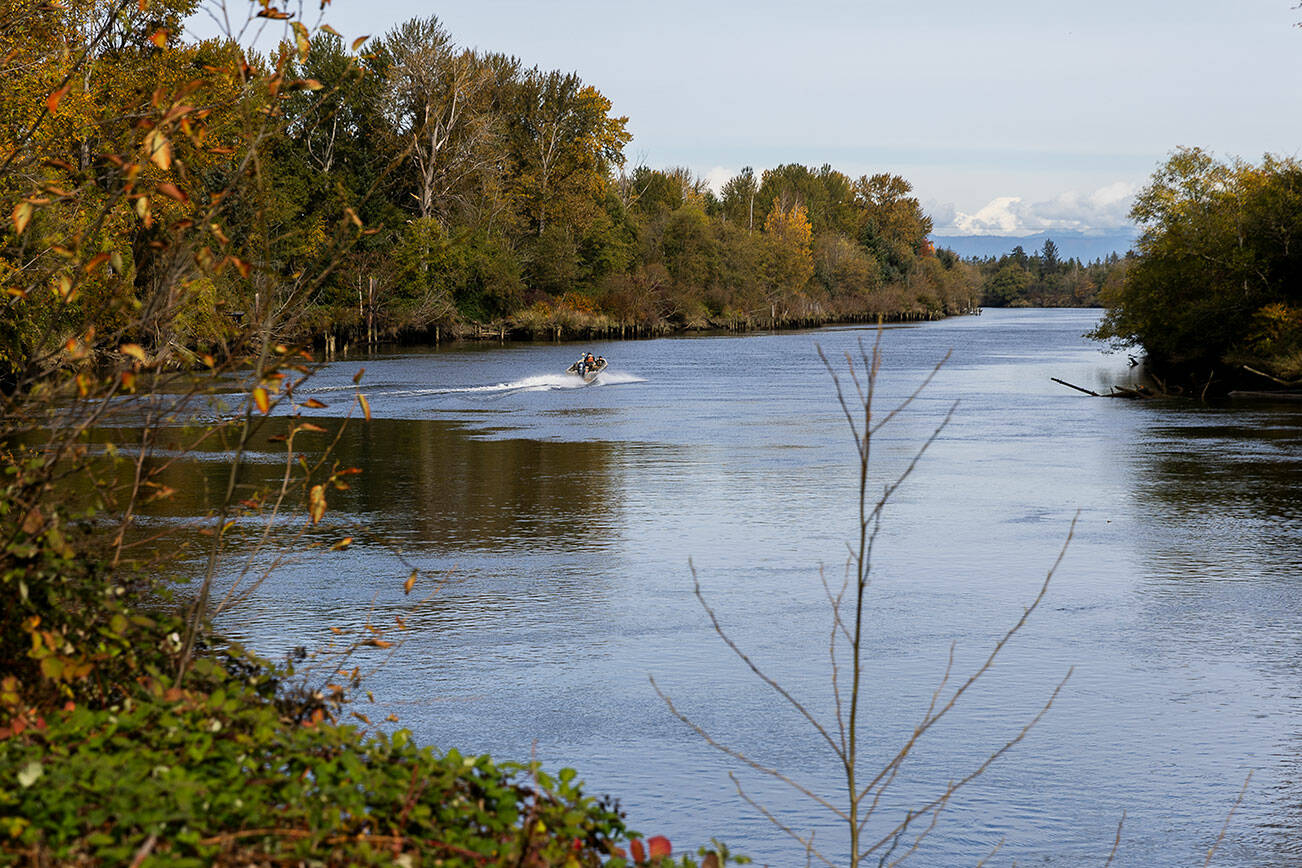Copyright Everett Herald

EVERETT — Last November, the city of Everett passed a historic initiative granting the Snohomish River legal standing rights in court On Friday, a group of developers will present its case that the law should be repealed. In January, the Master Builders Association of King and Snohomish Counties and local Everett developers, including the Robinett Brothers, Greencity Development and Washington Aggregates & Concrete Association, filed a complaint in Snohomish County Superior Court against the initiative. The litigants, represented by Davis Wright Tremaine LLP, a national industry-focused legal firm, argue that the initiative conflicts with federal and state laws, is outside the scope of local initiative power that allows citizens to create or repeal local laws, and will cause frivolous lawsuits because scientific certainty isn’t mandated for someone to file a case on behalf of the river. The initiative grants city residents the ability to take legal action against activities within city limits that negatively impact the watershed’s health, and adds Everett to a growing list of states and countries worldwide that are joining the Rights of Nature movement. The movement stems from indigenous mindsets that believe environments and natural entities should have the same rights as people to be protected and flourish. “This is not about environmental protection. We all want to have clean waters and a good, healthy environment for everyone,” said Brian Holtzclaw, general counsel for the Master Builder Association of King and Snohomish Counties. “This is simply about whether or not the way to address these issues is through the local initiative process.” Rachel Kurtz-McAlaine, an attorney and political consultant for Standing for Washington, an affiliate of the nonprofit Standing for Nature, which is defending the initiative in court, said the city law works to fill the gaps that existing laws might have and acts as a preventive measure to protect the watershed. “Protecting the environment is an uphill battle,” she said. “This was a way to have a local community be able to have some say in how the local river watershed gets treated, without adding more regulations.” In September, Everett city attorney Ramsey Ramerman submitted a response to the court on behalf of the city, siding with the developers that the initiative oversteps the legal authority local initiatives have and disrupts laws already in place to protect the environment. “While the City fully supports efforts to protect the Snohomish River Watershed, the City recognizes that existing federal and state law, along with the City’s own rules, regulations and ordinances, are already in place to protect the Watershed and other related bodies of water,” he wrote. Superior Court Judge Jennifer Langbehn hears arguments on Friday at 9:30 a.m. in room 3E of Snohomish County’s Superior Court. ‘I’m trying to parse words’ Multiple state and federal laws, such as the Clean Water Act, Shorelines Act, and Growth Management Act, already govern the Snohomish River Basin, regulating levels of pollution, destruction and development. Robert Maguire, an attorney for Davis Wright Tremaine, referred comments to Holtzclaw, who said the initiative conflicts with these preexisting laws. “A city doesn’t have authority to adopt laws that conflict with state or federal laws,” Holtzclaw said, claiming precedent from a case where the Washington Supreme Court voted down a Spokane initiative called the Community Bill of Rights. In 2009 and then again in 2011, a civil action group called Envision Spokane wrote an initiative that said residents had the “right to approve all zoning changes proposed for their neighborhood,” and that all “residents of Spokane possess fundamental and inalienable rights to sustainably access, use, consume, and preserve water drawn from natural cycles” from the Spokane River, its tributaries and the Spokane Valley-Rathdrum Prairie Aquifer. The initiative also attempted to grant rights to the Spokane River, its tributaries and the Spokane Valley-Rathdrum Prairie Aquifer, stating the watershed had the “rights to exist and flourish, which shall include the right to sustainable recharge, flows sufficient to protect native fish habitat, and clean water.” In addition to the watershed, the bill attempted to grant Spokane employees certain worker rights, including unionized workplaces the right to collective bargaining. The developers arguing against Everett’s initiative claim the same situation holds now and point to similar language in the initiative to grant the Snohomish River “the rights to exist, regenerate, and flourish, which shall include the right to naturally recharge, the right to naturally flow, the right to water quality necessary to provide habitat for native plants and animals, the right to provide clean water, and the right to restoration.” “If you just go through it side by side, there’s a few that the language is slightly different, but regardless, the case wasn’t decided by the Supreme Court based on whether or not a water right specifically was at issue or was granted. It was the whole host of the rights which is based upon the right to exist and flourish, which is the same language used in both initiatives,” Holtzclaw said. “I’m trying to parse words a little bit and trying to find a distinction that in my mind doesn’t really exist between the two initiatives.” Kurtz-McAlaine argues there are key differences between the two initiatives. “The Spokane initiative also had not just the rights of the river, but also the rights of the citizens in Spokane to use and access water,” she said. “And I think that’s where the court, they really had an issue with that.” Water allocation rights in the western United States are a complicated mix of state and federal laws and a subsequent complex history of who does and does not have access to water and for what uses. The state Supreme Court decision stated the Spokane initiative overstepped by trying to give residents free range to access and use the watershed, which includes the aquifer that extends into Idaho. The Everett initiative doesn’t attempt to grant citizens access to the water, meaning the law doesn’t cover water use rights. And unlike the Spokane bill, Everett’s law includes a preemption clause stating the initiative isn’t viable in cases where preexisting state and federal laws have already laid down regulations or specific enforcement jurisdiction. “Well, then, what does the initiative do? What is its purpose?” Holtzclaw said. ‘If somebody throws a candy wrapper in the river’ The plaintiffs are also arguing that because the initiative states scientific certainty isn’t needed for a case that the law will spark frivolous litigation. “This initiative creates a situation where a builder can get approval for a project that complies with all the laws and regulations, but someone under this initiative could argue that not notwithstanding compliance with those laws, [they] think that it’s still going to damage to the watershed,” Holtzclaw said. “And then, to make it even more challenging, the initiative says any such damages don’t have to be proven with scientific certainty.” Ramerman’s response echoed Holtzclaw’s, and in his statement, he wrote that the initiative “disrupts that balance by adopting a zero-impacts requirement that undermines all of the efforts of the City to protect the environment without shutting down all development and industry within the City.” The language of the initiative doesn’t encourage frivolous lawsuits or discourage development, Kurtz-McAlaine said. The initiative states that if a lawsuit is successful, the damages will be the cost of what it will take to restore the watershed before the violation occurred. Additionally, that money will be paid to the city of Everett, not whoever brought the violation to court. “If somebody throws a candy wrapper in the river, there’s not enough of a restoration there, a remedy, for a court to take that on,” Kurtz-McAlaine said. “It’s really designed for large impacts that somehow made its way around regulations.” Regarding the lack of scientific certainty needed for a case, Kurtz-McAlaine said that the standard doesn’t open the floodgates to possible litigation. The initiative hasn’t been used yet, but violations would fall under a civil offense, Kurtz-McAlaine said. Civil cases typically refer to the preponderance of evidence concept, meaning the party making the claim — that something or someone is harming the river — has to prove that their argument is more than 50% likely to be true. Environmental and public health law often uses the precautionary principle, which operates on a “better safe than sorry” philosophy when arguing cases, making proponents of certain actions prove that whatever they plan to do won’t cause harm. “There still needs to be credible evidence,” Kurtz-McAlaine said. “If you kind of wait for the scientific certainty, then it’s too late. The harm could be just impossible to remedy.” ‘That’s not a reason to get rid of it’ When the initiative passed last November, Kurtz-McAlaine said Standing for Washington expected the new law to be met with opposition. “It’s such a novel concept that I think it’s just scary to developers because it’s new and they haven’t seen how it could work,” she said. “But, that’s not a reason to get rid of it.” Standing for Washington supports development as long as it’s done in a way that doesn’t harm the watershed, she said, and she believes that the community of Everett, which voted the initiative in, holds the same sentiment. Eliza Aronson: 425-339-3434; eliza.aronson@heraldnet.com; X: @ElizaAronson. Eliza’s stories are supported by the Herald’s Environmental and Climate Reporting Fund.



